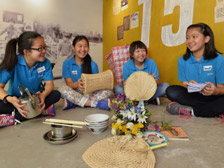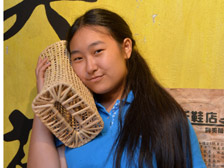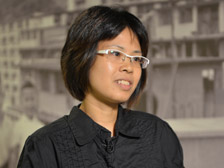
Life lesson:
After hearing stories from former public housing estate residents about decades past, then acting out their roles, the Girl Guides gained a new appreciation of their modern-day material comforts.
Life lesson:
After hearing stories from former public housing estate residents about decades past, then acting out their roles, the Girl Guides gained a new appreciation of their modern-day material comforts.

Time shifter:
After Audrey Chau took on the role of an older sister who left school to become a garment factory worker to help pay her brother’s medical bills, she vowed to study hard in school.
Time shifter:
After Audrey Chau took on the role of an older sister who left school to become a garment factory worker to help pay her brother’s medical bills, she vowed to study hard in school.

Common denominator:
Programme instructor Karen Wong says using drama rather than textbooks to teach Hong Kong history can help participants explore the values that held Hong Kong together, and to appreciate what they have today.
Common denominator:
Programme instructor Karen Wong says using drama rather than textbooks to teach Hong Kong history can help participants explore the values that held Hong Kong together, and to appreciate what they have today.
Dramatic history lesson evokes appreciation
August 17, 2014
A group of Girl Guides has undergone a dramatic experiment that let them vicariously step into their grandmothers’ shoes to understand the challenges people faced growing up in Hong Kong in the 1960s and ‘70s – and appreciate what they have today.
More than 30 young women, all born after the year 2000, recently gathered at Mei Ho House, a former Shek Kip Mei public housing block that has been transformed into a museum and hostel. The Hong Kong Heritage Project, a non-governmental organisation, had invited them to a unique workshop to learn about the city’s development – and earn their Hong Kong history badge.
Former residents of the housing block led them on a guided tour, relating stories from past decades and showing them artefacts and photographs from days gone by.
Afterwards, the girls were split into three groups and asked to create stage plays based on the information they had gleaned, and to take on the roles of family members that lived in such housing estates.
Present-day appreciation
Girl Guide Audrey Chau, aged 12, took up the role of the oldest sister in a poor family, who was born in the 1950s. She willingly gave up her studies to become a garment factory worker, to earn money to pay for her sickly brother’s medical bills.
After her performance, Audrey vowed to study hard in school.
“If I had lived in the past, I would not have had the chance to study, as I am the oldest sister at home and I would have needed to work in a factory to earn a living. I am glad that I have chance to study now.”
Bamboo pillows, palm-leaf fans, and metal rice pots - all daily necessities in decades past - were used as props in the dramas. Windy Tang, aged 14, clutched a rice pot in her role as a young factory worker.
“I was surprised that the rice pot did not do a good job keeping the rice warm,” Windy said afterwards.
“They didn’t have air-conditioners at home in the past, and people needed to use palm-leaf fans to keep cool. I am now indeed thankful for the material comforts I have today.”
Fresh perspective
The girls learned that in those old housing estates, communal kitchens were located outside the flats, and residents shared toilets. This provided ample opportunities for neighbours to interact, creating a harmonious atmosphere.
The situation is quite different today, 13-year old Nicole Woo said, after taking part in the drama. She admitted she does not even know her neighbours’ names. Having experienced how things were in the past, though, she has been inspired to get to know those living next door to her.
“I will offer homemade snacks to my neighbours, and try to get to know them,” she said.
Following the workshop, Windy Tang is determined to improve her relationships with family members.
“I won’t use my smartphone during meals and will try to communicate more with them. I hope my family members can do that, too - keeping their eyes off their phones, and talking to me.”
Values exploration
Programme instructor Karen Wong directed the Girl Guides to act out life on a public housing estate. She stressed that it was more than simply an immersion exercise into the typical daily life of their grandmothers, but rather an exploration of the values that held Hong Kong together, and make Hong Kong the city it is today.
“Perhaps now they can understand why their grandmothers are so talkative, as their personality was shaped by the harmonious neighbourhood,” she said.
Hong Kong Heritage Project Manager Melanie Li noted that the programme aims to help participants understand the importance of history. She hopes this method of learning history through drama can be introduced in schools in future. The experience not only enriches history knowledge, but helps young people understand that history is not just about the past - it also informs the present and shapes the future, she said.